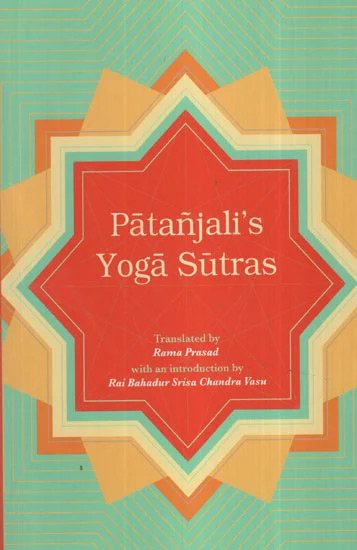Yoga-sutras (with Vyasa and Vachaspati Mishra)
by Rama Prasada | 1924 | 154,800 words | ISBN-10: 9381406863 | ISBN-13: 9789381406861
The Yoga-Sutra 2.52, English translation with Commentaries. The Yoga Sutras are an ancient collection of Sanskrit texts dating from 500 BCE dealing with Yoga and Meditation in four books. It deals with topics such as Samadhi (meditative absorption), Sadhana (Yoga practice), Vibhuti (powers or Siddhis), Kaivaly (isolation) and Moksha (liberation).
Sūtra 2.52
Sanskrit text, Unicode transliteration and English translation of Sūtra 2.52:
ततः क्षीयते प्रकाशावरणम् ॥ २.५२ ॥
tataḥ kṣīyate prakāśāvaraṇam || 2.52 ||
tataḥ—then. kṣīyate—is destroyed, prakāśa—of light. āvaraṇam—the cover.
52. Thence the cover of light is destroyed.—103.
The Sankhya-pravachana commentary of Vyasa
[English translation of the 7th century commentary by Vyāsa called the Sāṅkhya-pravacana, Vyāsabhāṣya or Yogabhāṣya]
[Sanskrit text for commentary available]
The karma of the Yogī which covers up the discriminative knowledge is destroyed as he practises the Prāṇāyāma. This is what they say—‘By the magic panorama of desire, the Essence, which is luminous by nature, is covered up, and the same is directed towards vice.’ This karma of the Yogī which covers up the light and binds him to repeated births, becomes weak by the practice of Prāṇāyāma every moment, and is then destroyed. And so it has been said:—‘There is no purificatory action higher than Prāṇāyāma; purity is secured by that, through the destruction of impurity; and the light of knowledge shines’.—103.
The Gloss of Vachaspati Mishra
[English translation of the 9th century Tattvavaiśāradī by Vācaspatimiśra]
He describes the object of Prāṇāyāma:—‘Thence the cover of light is destroyed.’ The cover is that which covers up the light of Mental Essence. It means the afflictions and sin. He explains: The karma of the Yogī......... as he practices Prāṇāyāma.’ Knowledge is that by which anything is known. It is the light of the Mental Essence. Discriminative knowledge is the knowledge of the distinction (between the Objective Essence and consciousness). That which covers up discriminative knowledge ‘is the karma which covers up.’ Karma means the vice which is brought about by action so called, and the afflictions caused thereby. He says that the Āgamis agree in this matter:—‘This is what they say.’ Desire is spoken of as the Great Forgetfulness. By the mention of desire is to be understood Nescience also which is found inseparably joined to it.
Vice is that which should not be done.
The question arises that if Prāṇāyāma alone does away with Vice what is the use of purificatory action? (Tapas). For this reason he says:—“Becomes weak” and not altogether destroyed by it. Therefore, purificatory action is necessary for its destruction. In this too the Āgamis agree ‘And so it has been said.’
Manu also says:—‘Let the defects be burnt up by Prāṇāyāma.’
The Viṣṇu Purāṇa speaks of the Prāṇāyāma as an accessory of Yoga:—‘He who masters the air known as Prāṇa by practice, is said to have secured Prāṇāyāma.’ It is either seeded or seedless. When the powers known as Prāṇa and Apāṇa are mastered one by the other, it is two-fold. The third is that when both are checked.—52.
